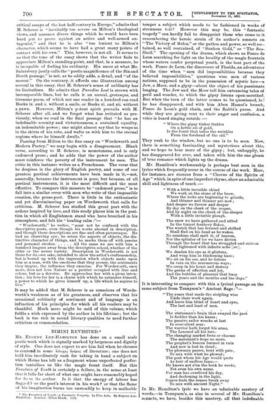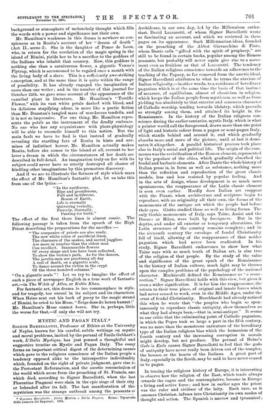BIMINI REVISITED.* ME. EUGENE LEE-HAMILTON has done on a small
scale poetic work which is signally marked by largeness and dignity of style. One does not expect to see him fail when he chooses to contend in some ;Aro; Speithoc of literature ; one does not hold him inordinately rash for taking in hand a subject on which Heine has ]eft us a fragment whose unperfected perfec- tion tantalises us like the magic fount itself. But this Fountain of Youth is certainly a failure, in the sense at least that it falls far short of what one might have reasonably hoped for h.( m its author. Is it that the energy of labour has flagg,cd ? or the poet's interest in his work P or that the flame of his imagination burns too unsteadily to keep in malleable • The Fountain of Youth, a Fantastic Tragedy. Iu Five Acts. By Eugene Lee- Hamilton. London: Elliot Stook. MI.
temper a subject which needs to be fashioned in weeks of strenuous toil ? However this may be, this " fantastic tragedy" can hardly fail to disappoint those who come to it
remembering the heroic strain of its author's sonnets on " The Victory of bielos," or the pathos and power, so well sus- tained, so well restrained, of "Sunken Gold," or "The Sea- Shell." The opening of the drama, which shows us Ponce de Leon searching for light on the locality of the magic fountain whose waters confer perpetual youth, is the best part of the work. Ponce de Leon, the discoverer of Florida, an adventurer of the time when " men did impossibilities because they believed impossibilities," questions wise men of various nations, supposed to be in the possession of mystic lore—a
Jew, a Moor, and a gipsy—about the object of his passionate longing. The Jew and the Moor tell him entrancing tales of peril and wonder, to which the gipsy listens open-mouthed. But when the turn of the latter comes to be questioned, lo ! he has disappeared, and with him Aben Hamet's broocb, Ponce de Leon's gold chain, and the Rabbi's purse. And while they are giving vent to their anger and confusion, a voice is heard singing outside :-
" Where the gipsy tinker tinkles On a kettle all of gold,
Is the fount that takes the wrinkles From the forehead of the old."
They rush to the window, but no one is to be seen. Now, there is something fascinating and mysterious about this, and we hope to hear more of the gipsy ; but, unhappily, he has disappeared for ever, and taken with him the one gleam of true romance which lights up the drama.
Mr. Hamilton's workmanship is perhaps best seen in the lyrics which frequently occur in the course of the work. Here, for instance, are stanzas from a " Chorus of the Spirits of Age" which, in spite of one imperfect rhyme, show an admirable skill and lightness of touch :—
" With a little invisible chisel
We work on the stone of the brow, Where the locks are beginning to grizzle, And thinner and thinner are now ; And deeper we furrow and deeper By day on the cheek of the reaper, And by night on the cheek of the sleeper With a little invisible plough.
The snow we have gathered and sifted In the tiniest feathery flakes, The wretch that has fevered and shifted Shall find on his head as he wakes.
No sunshine shall melt it, of heaven, Nor the splinter of ice we have driven Through the heart that has struggled and striven
And tightened with infinite ache [sic].
We deaden his eye as it glistens, And wrap him in thickening haze; We sit on his ear, and he listens In vain on the murmurous ways ; We creep in his heart and destroy The germs of affection and joy, And the bubbles of pleasure that buoy The years and the months and the days."
It is interesting to compare with this a lyrical passage on the same subject from Tennyson's " Ancient Sage :"— " The years that made the stripling wise Undo their work again, And leave him blind of heart and eyes, The last and least of men.
. . ..... . . .
The statesman's brain that swayed the past Is feebler than his knees ; The passive sailor wrecks at last In ever-silent seas ; The warrior hath forgot his arms, The Learned all his lore ; The changing market frets or charms The merchant's hope no more.
The prophet's beacon burned in vain And now is lost in cloud ; The plowman passes, bent with pain, To mix with what he plowed; The poet whom his Age would quote
As heir of endless fame,—
He knows not e'en the book he wrote,
Not even his own name.
For man has overlived his day, And darkening in the light, Scarce feels the senses break away To mix with ancient Night."
In Mr. Hamilton's lyric we have an *admirable mastery of words,—in Tennyson's, as also in several of Mr. Hamilton's
sonnets, we have, besides this mastery, all that indefinable
background or atmosphere of melancholy thought which fills the words with a power and significance not their own.
Mr. Hamilton's weakness in this drama is nowhere so con- spicuous as in Rosita's account of her " dream of death " (Act II., scene 3). She is the daughter of Ponce de Leon, who, in return for the revelation of the magic spring in the island of Bimini, yields her to be a sacrifice to the goddess of the Indians who inhabit that country. Now, this goddess is nothing else than a carnivorous flower, a gigantic Venus's Flytrap, which is accustomed to be regaled once a month with the living body of a slave. This is a sufficiently awe-striking conception, and at the same time it is quite within the range of possibility. It has already engaged the imagination of more than one writer ; and in the number of this journal for October 24th, we gave some account of the appearance of the cannibal plant in literature. Mr. Hamilton's "Terrific Flower," with its vast white petals dashed with blood, and its delicious stupifying odour, is more like a poetic fiction than Mr. Dunstan's tangled mass of murderous tendrils, and
it is not so impressive. For one thing, Mr. Hamilton repre- sents the petals as the instrument of the deadly embrace. No one who has any acquaintance with plant-physiology
will be able to reconcile himself to this notion. But the main fault we have to find is that instead of gradually revealing the startling fate of Rosita in hints and sur- mises of indistinct horror, Mr. Hamilton actually makes Rosita, before she comes to the island at all, recount to her lover a dream in which the circumstances of her death are described in fall detail. An imagination truly on fire with its subject could never have so utterly destroyed all chance of kindling other imaginations by this premature discovery. And if we are to illustrate the flatness of style which mars the effect of Mr. Hamilton's fantastic plot, let us take this from one of the lyrics :-
" In the auriferous, Ripe and graniferous, Full and lactiferous,
Bosom of Earth, Life is eternally Quivering vernally, Fiercely, diurnally, Panting for birth."
The effect of the first three lines is almost comic. The following passage is taken from the speech of the High Priest describing the preparations for the sacrifice :-
" The companies of priests are also ready,
The new white robes of sacrificial linen, The charmers of the snakes, and sacred jugglers Are more in number than the oldest man Can recollect. Innumerable flowers Of every shape and hue have been collected, To show the victim's path. As for the dances, The javelin-men are practising all day A reel of death, on a gigantic scale, To dance around the victim in the crypt Of the three hundred columns."
"On a gigantic scale " ! Let us try to imagine the effect of such a piece of newspaper English in a true work of fantastic art,—in The Witch of Atlas, or Kubla Khan.
For fantastic art, this drama is too commonplace in style, and for tragedy, too unreal in its subject and its characters.
When Heine sent out his bark of poesy to the magic strand of Bimini, he cried to his Muse, " Zeige dass du hexen kannst !'
Mr. Hamilton's Muse cannot hexen. She is, perhaps, little the worse for that,—if only she will not try.



















































 Previous page
Previous page